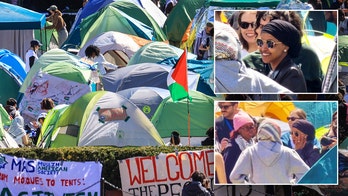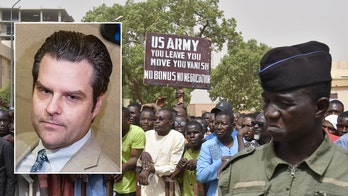President Obama has dispatched a top national security aide to the Persian Gulf and Sudan as U.S. concerns mount over increasing violence in Yemen and the future of Sudan's north-south peace agreement.
The White House said Obama's Homeland Security and Counterterrorism adviser, John Brennan, held meetings in Sudan's capital of Khartoum on Wednesday to discuss deteriorating security conditions around the disputed Sudanese border town of Abyei. Brennan will then travel this week to Saudi Arabia and the United Arab Emirates for talks with officials there about Yemen.
Khartoum's troops have occupied Abyei, a flashpoint town between north and south Sudan, after months of building tensions between the two armies. Both sides claim Abyei, a fertile, oil-producing zone. The invasion sent some 80,000 residents running for their lives and created conditions for a humanitarian emergency, according to Western diplomats and U.N. officials.
South Sudan is to secede from the north next month as the result of an independence referendum agreed to in a 2005 peace deal that ended what was then Africa's longest-running civil war. Brennan told Sudanese officials of Obama's "deep concern" over the north's military presence in Abyei and "urged a rapid and peaceful resolution to the crisis," the White House said.
The U.S. had told Khartoum that its acceptance of the referendum result would be a factor in its review of whether Sudan should be removed from the State Department's list of state sponsors of terrorism, a designation that carries significant sanctions.
In his talks with Sudanese officials, Brennan discussed the status of that review and relayed the importance the administration places on Sudan's continuing counterterrorism cooperation against al-Qaida and affiliated groups, the White House said.
Secretary of State Hillary Rodham Clinton will be visiting African Union headquarters in Addis Ababa, Ethiopia, in mid-June and the situation in Sudan is likely to be high on her agenda.
In Yemen, violence intensified after President Ali Abdullah Saleh reneged on agreements negotiated by the Gulf Cooperation Council to relinquish power.
"We strongly condemn the recent clashes in Sanaa and the deplorable use of violence by the government against peaceful demonstrators in Taiz," the White House said, referring to security forces uses of force in the capital and another town. "These tragic events underscore the need for President Saleh to sign the GCC-brokered transition proposal and to begin the transfer of power immediately."
Clinton echoed those comments on Wednesday.
"If it wasn't obvious before, it certainly should be now that his presence remains a source of great conflict and, unfortunately, as we have watched over the last several days, even military action and violence," she told reporters at the State Department.
"President Saleh was given a very good offer that we strongly backed by the Gulf countries," she said. "We cannot expect this conflict to end unless President Saleh and his government move out of the way to permit the opposition and civil society to begin a transition to political and economic reform."




